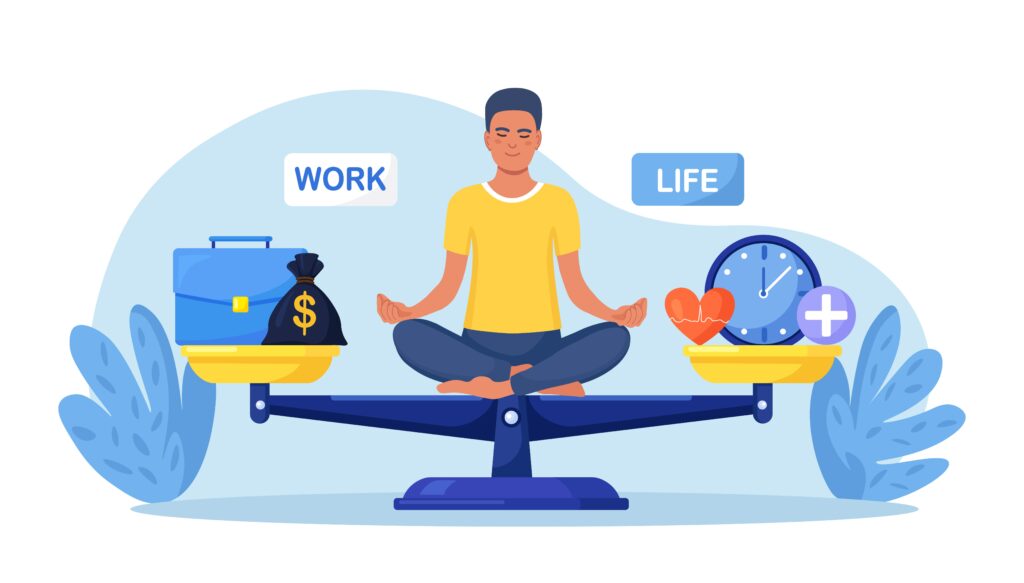In the modern landscape, remote work has become more prevalent than ever, offering flexibility and convenience. However, with this flexibility comes the challenge of balancing work and life while working remotely. Finding equilibrium between professional responsibilities and personal well-being is crucial for long-term success and happiness. In this blog, we’ll explore ten essential tips for achieving and maintaining balance while working remote.
Establish a dedicated Workspace
Create a designated area in your home solely for work purposes. This helps mentally separate your professional and personal life, enhancing focus during work hours and allowing you to ‘leave’ work at the end of the day.
Define Clear Boundaries
Set clear boundaries with yourself and others regarding work hours and availability. Communicate your schedule to family members or housemates to minimize interruptions during designated work times.
Stick to a Routine
Maintain a consistent daily routine that includes set working hours, breaks, and time for personal activities. A structured schedule enhances productivity and prevents work from encroaching into leisure time.
Prioritize Tasks
Identify and prioritize your most important tasks each day. Utilize productivity techniques such as the Eisenhower Matrix or time blocking to efficiently manage your workload and avoid feeling overwhelmed.
Take Regular Breaks
Schedule short breaks throughout your workday to recharge and prevent burnout. Engage in activities that promote relaxation and mental clarity, such as stretching, going for a walk, or practicing mindfulness.
Embrace Flexibility
One of the perks of remote work is flexibility. Take advantage of this by adjusting your schedule to accommodate personal commitments or unexpected events. Flexibility fosters a healthier work-life balance and reduces stress.
Limit Multitasking
While multitasking may seem efficient, it often leads to decreased productivity and increased stress levels. Focus on one task at a time, dedicating your full attention to each before moving on to the next.
Communicate Effectively
Maintain open and transparent communication with your colleagues and supervisors. Clearly communicate your availability, progress on tasks, and any challenges you may be facing. Effective communication fosters collaboration and prevents misunderstandings.
Set Realistic Expectations
Be realistic about what you can accomplish within a given timeframe. Avoid overcommitting yourself or taking on more than you can handle. Setting realistic expectations helps manage stress and prevents feelings of inadequacy.
Prioritize Self-Care
Make self-care a priority by prioritizing activities that promote physical, mental, and emotional well-being. Exercise regularly, get an adequate amount of sleep, and engage in hobbies or activities that bring you joy and fulfillment outside of work.
FAQ
Establishing clear boundaries starts with creating a dedicated workspace in your home and defining set working hours. Communicate your schedule to family members or housemates, and designate specific times for work-related activities. When your workday ends, physically and mentally disconnect from work by closing your workspace and engaging in non-work-related activities.
Combat feelings of isolation by proactively seeking opportunities for social interaction and connection. Schedule virtual coffee breaks or team meetings to maintain regular communication with colleagues. Join online communities or professional networks related to your field to foster connections and exchange ideas. Additionally, consider participating in virtual events or workshops to expand your network and combat feelings of isolation.
Prioritize self-care by incorporating activities that promote physical, mental, and emotional well-being into your routine. Schedule regular breaks, exercise regularly, and practice mindfulness or meditation to reduce stress and promote relaxation. Set boundaries around work hours and disconnect from technology during non-work times to prevent burnout. Seek support from friends, family, or mental health professionals if you experience persistent feelings of stress or burnout.
Balancing work and life while working remotely is a continuous journey that requires intentionality and self-awareness. By implementing these ten tips into your daily routine, you can cultivate a harmonious balance between your professional and personal life, leading to greater satisfaction and overall well-being in the remote work environment.
